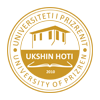.
PROGRAM EVALUATION
Program : AGRIBUSINESS, BA, re/accreditation
| Name of the study program | Agribusiness |
| Level of qualification according to KKK (abbreviations BA, B. Sc, MA, PhD) | B.sc. (Bachelor of Science) |
| Academic grade and diploma title (in full and abbreviations) | Agribusiness (B. Sc. Agribusiness) |
| The study area according to Erasmus Subject Area Codes (ESAC) | 01.2 |
| Academic program profile (specialization) | Life Sciences (Agribusiness Management) |
| The minimum study length | 3 years |
| Study cycle (full-time; part-time) | Full-time |
| Number of ECTS credits (total and per year) | 180 ECTS |
| Modules / subjects | Mathematics Plant production Economics Rural sociology Basics of research methodology Principles of marketing Animal production Agricultural economy Business statistics English Language Accounting Farm management Business law Introduction to finance Horticulture Extension services in agribusiness Marketing of agricultural products Agribusiness management |
| Agribusiness Financial management Business communication Organic production Processing technology of vegetable products in Agriculture Plant protection Production in Greenhouses Agribusiness projects Cooperatives and integration in Agriculture Economics Botany Marketing research EU Common agricultural policy Rural Tourism Management Rural Development Career management Prices and markets of agricultural products Consumer behavior Human resource management Introduction to international business Food Product quality management Food Processing and Nutrition Viticulture and enology Economics of Public Administration Farm Accountancy Data Network (FADN) Business informatics Applied statistics Advanced agribusiness logistics Professional practice B.Sc. Thesis | |
| Number of students to be enrolled | 80 |
| Leading Professors of the study program | Prof. ass. dr. Sadik Maloku Prof. asoc. dr. Isuf Lushi |
| Prof. asoc. dr. Shukri Maxhuni | |
| The permanent academic staff/artistic (According to the academic grade) | Five (5) Professors: four Associated Professors (4), one (1) Assistant Professors |
| Tuition fee | 0€ per semester According to administrative guidance of MESTI |

